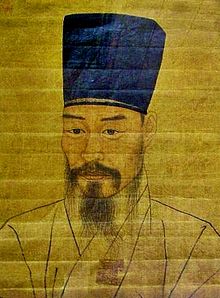This article may require copy editing for grammar, style, cohesion, tone, or spelling. (August 2023) |
| Jo Gwang-jo | |
 | |
| Korean name | |
|---|---|
| Hangul | 조광조 |
| Hanja | |
| Revised Romanization | Jo Gwangjo |
| McCune–Reischauer | Cho Kwangjo |
| Art name | |
| Hangul | 정암 |
| Hanja | |
| Revised Romanization | Jeongam |
| McCune–Reischauer | Chŏngam |
| Courtesy name | |
| Hangul | 효직 |
| Hanja | 孝直 |
| Revised Romanization | Hyojik |
| McCune–Reischauer | Hyojik |
| Posthumous name | |
| Hangul | 문정 |
| Hanja | |
| Revised Romanization | Munjeong |
| McCune–Reischauer | Munjŏng |
| Clan Origin | |
| Hangul | 한양 |
| Hanja | |
| Revised Romanization | Hanyang |
| McCune–Reischauer | Hanyang |
Jo Gwang-jo (Korean: 조광조, 23 August 1482 – 10 January 1520), also called by his art name Jeongam (정암), was a Korean Neo-Confucian scholar who pursued radical reforms during the reign of Jungjong of Joseon in the early 16th century.
He was framed with charges of factionalism by the power elite that opposed his reform measures and was sentenced to drink poison in the Third Literati Purge of 1519. He has been widely venerated as a Confucian martyr and an embodiment of "seonbi spirit" by later generations in Korea. Some historians consider him one of the most influential figures in 16th century Korea. He is known as one of the 18 Sages of Korea (동방18현) and honored as Munmyo Baehyang (문묘배향; 文廟配享).[1]
- ^ Annals of the Joseon Dynasty, September 15, 1604. No. 4